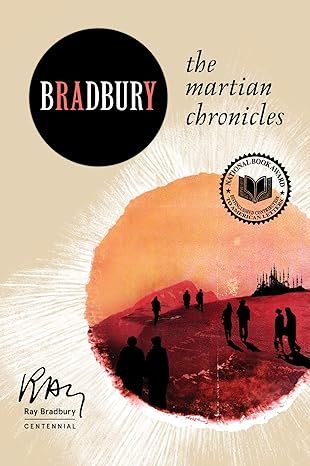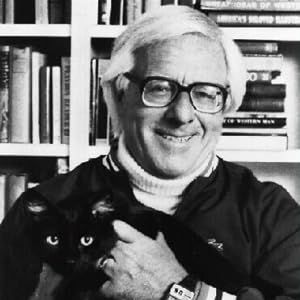The Martian Chronicles
4.5 out of 5
7,293 global ratings
Mars was a distant shore, and the men spread upon it in waves... Each wave different, and each wave stronger.
The Martian Chronicles
Ray Bradbury is a storyteller without peer, a poet of the possible, and, indisputably, one of America's most beloved authors. In a much celebrated literary career that has spanned six decades, he has produced an astonishing body of work: unforgettable novels, including Fahrenheit 451 and Something Wicked This Way Comes; essays, theatrical works, screenplays and teleplays; The Illustrated Man, Dandelion Wine, The October Country, and numerous other superb short story collections. But of all the dazzling stars in the vast Bradbury universe, none shines more luminous than these masterful chronicles of Earth's settlement of the fourth world from the sun.
Bradbury's Mars is a place of hope, dreams and metaphor-of crystal pillars and fossil seas-where a fine dust settles on the great, empty cities of a silently destroyed civilization. It is here the invaders have come to despoil and commercialize, to grow and to learn -first a trickle, then a torrent, rushing from a world with no future toward a promise of tomorrow. The Earthman conquers Mars ... and then is conquered by it, lulled by dangerous lies of comfort and familiarity, and enchanted by the lingering glamour of an ancient, mysterious native race.
Ray Bradbury's The Martian Chronicles is a classic work of twentieth-century literature whose extraordinary power and imagination remain undimmed by time's passage. In connected, chronological stories, a true grandmaster once again enthralls, delights and challenges us with his vision and his heart-starkly and stunningly exposing in brilliant spacelight our strength, our weakness, our folly, and our poignant humanity on a strange and breathtaking world where humanity does not belong.
288 pages,
Kindle
Audiobook
Hardcover
Paperback
First published October 10, 2011
ISBN 9780062079930
About the authors
Ray Bradbury
In a career spanning more than seventy years, Ray Bradbury, who died on June 5, 2012, at the age of 91, inspired generations of readers to dream, think, and create. A prolific author of hundreds of short stories and close to fifty books, as well as numerous poems, essays, operas, plays, teleplays, and screenplays, Bradbury was one of the most celebrated writers of our time. His groundbreaking works include Fahrenheit 451, The Martian Chronicles, The Illustrated Man, Dandelion Wine, and Something Wicked This Way Comes. He wrote the screen play for John Huston's classic film adaptation of Moby Dick, and was nominated for an Academy Award. He adapted sixty-five of his stories for television's The Ray Bradbury Theater, and won an Emmy for his teleplay of The Halloween Tree. He was the recipient of the 2000 National Book Foundation Medal for Distinguished Contribution to American Letters, the 2004 National Medal of Arts, and the 2007 Pulitzer Prize Special Citation, among many honors.
Throughout his life, Bradbury liked to recount the story of meeting a carnival magician, Mr. Electrico, in 1932. At the end of his performance Electrico reached out to the twelve-year-old Bradbury, touched the boy with his sword, and commanded, "Live forever!" Bradbury later said, "I decided that was the greatest idea I had ever heard. I started writing every day. I never stopped."
Read more
Reviews
JL, Prunedale, CA
5
Quite an interesting read
Reviewed in the United States on September 9, 2021
Verified Purchase
I had read only one book by Bradbury, Fahrenheit 451, and that one only a few years ago. But recently a good friend, who knows more about authors and books than I ever will, emailed me a link about Bradbury on the occasion of his birthday. That piece sent me on a quest to learn more about him and his writings, and I ran across a long Wikipedia article on him, chock full of interesting things I did not know, including this quote attributed to Bradbury: “First of all, I don't write science fiction. […] Science fiction is a depiction of the real. Fantasy is a depiction of the unreal. So Martian Chronicles is not science fiction, it's fantasy. It couldn't happen, you see?” That statement intrigued me. So, having read several of the ERB John Carter of Mars series, I decided it would be interesting to read Bradbury’s take on Mars, and it certainly was. Bradbury’s tales are shot through and through with what often is almost an in-your-face commentary on the human condition and human nature, and not a very complementary one, at that. And reading stories in 2021 that were composed in the late 1940s and published as a book in 1950 was a bit of an eerie experience, given that the opening story is set in a fictional January 2030—less than 9 years from now. In fact, the original edition has the action starting in 1999! Seeing how Bradbury imagined voyages to Mars and life on Mars so matter-of-factly 70 years ago, juxtaposed with what we know about the real challenges of interplanetary travel and the inhospitable conditions on the real Mars, made this an interestingly anachronistic kind of read. And although I certainly did not like or approve of the actions of many of the characters, I quite enjoyed the chronological ordering of the chapters and the fact that some of the early characters reappeared in subsequent stories. And I love the fact that reading on my Kindle app enables me to quickly search back to see where a character fist appeared!
Read more
3 people found this helpful

Juushika
5
Not the most unique alien race, but a haunting, memorable, and relevant collection. Enthusiastically recommended
Reviewed in the United States on March 25, 2009
Verified Purchase
Written as a number of short stories that build a coherent arc, The Martian Chronicles is the story of mankind's repeated attempts to colonize Mars. Before man, Mars is populated by a psychic race that is in some ways surprising similar to Earth's western civilizations, a suburban utopia of housewives, gardens, and jobs, but with more complex and ancient arts, histories, and literature. Earth's initially missions are all failures, but eventually the Martian race is wiped out and humans colonize the planet, destroying the old beauty that the Martians leave behind. When Earth begins to collapse in nuclear war, Mars is abandoned, left to a few stragglers and some new immigrants. The whole of the work is varied, and each chapter/short story is different: some expository, some humorous, some scientific, some bittersweet, some about Martians, some about humans. There is something haunting and memorable about the text, the last chapters specifically, and while The Martian Chronicles is not my favorite sci-fi work or even my favorite book about an alien race (that would be Asimov's The God's Themselves), it is classic Bradbury: surreal yet suburban, science-fiction but relevant, ironic, enjoyable, bittersweet, and all in all a good book. I recommend it.
It is hard to discuss or summarize The Martian Chronicles because of the amount of variety from chapter to chapter in the text. Each chapter reads like an independent short story and could even stand alone. However, as a whole the text does build a definitive arc, creating a final product that is greater than the sum of its parts. As a result of this build up, the last chapters are definitely the best of the bunch--they are the ones that will stick with the reader and carry the most impact. They are also the most depressing, surreal, and haunting of the bunch--haunting is a world that I'll use a lot because it really is the best descriptor of the final effect of this book. While early sections are funny and some later sections truly ironic and cynical, the book ends with the remnants of an abandoned planet, creating a story of remorse, memories, and, in the very end, the possibility of hope. The Martian ghost town is an image that sticks with you. It's magical, unreal, and, yes, haunting.
The Martian Chronicles is classic Bradbury in its relevance, however--while the book may end with an abandoned foreign planet, every event implies a lesson and every lesson can be carried over to our domestic culture on earth. Bradbury teaches cynicism, the ignorance and foolishness of humans, our weakness, our hubris (and with it our downfall), the fragility of all people on all planets, and, somehow, ultimately, the human/sentient ability to persevere. It may be about Mars, but this is a very human book. While taking the reader to a foreign landscape, Bradbury ultimately reminds him of his own backyard.
There is a lot of good sci-fi out there, and there are better (more original, more unique) examples of alien races, but Bradbury's Martian Chronicles is still worth reading. It's easy to get into and addicting, a very interesting concept, delightfully ironic, a little bit religious, very spiritual, bittersweet and hopeful. I enjoy this book and have read it a few times myself. I recommend it to others, although there is other sci-fi worth reading too. Pick this one up if the idea interests you or if you like Bradbury's other books.
Read more
8 people found this helpful
Amazon Customer
5
Brilliant, haunting, memorable
Reviewed in the United States on May 18, 2024
Verified Purchase
A book about the human condition that just happens to take place on Mars. I thought I was going to walk away feeling depressed, but Bradbury managed an infusion of hope at the end. I can see myself rereading this many times just to see what I missed the first time. Highly recommended.
Amazon Customer
5
Martian Chronicles/ Ray Bradbury
Reviewed in the United States on July 28, 2024
Verified Purchase
I've been a fan of Bradbury since I was a boy. There was a story, possibly by Bradbury, about the old scifi tales of Mount Shasta and the beings who lived there. I can't remember it's title. Great tale!
Always a good read.
BDSNorthCarolina
5
Decades old, and just as meaningful and enjoyable now
Reviewed in the United States on November 29, 2021
Verified Purchase
I first read this in 8th grade (over 50 years ago), and it shocked me. To that point my science fiction reading was all spaceships, ray guns, bug-eyed evil aliens, and obvious 'good guys'. Bradbury writes true literature, and often has the voice of a poet. There is some talk of rockets, but no scenes occur on the rocket in space; they are mere means to get people from a known Earth, to the unknowns of another planet. No ray guns either, though the ancient Martians have interesting weapons. The ancient Martians are mirrors of us; both good and bad - but more what we wish we could be. There are a few true "good guys" and some "bad guys" as well, but most characters are just regular people who do their best. At its basic level, it is a story of humanity's good parts, bad parts, foibles, and strengths, and how people respond to the unknown and novel situations. My original copy of Chronicles has long since yellowed out and its pages have fallen apart. While this version annoyingly has advanced the dates well into the 21st century (decades later than Bradbury's original - Why? I don't find Jules Verne or unreadable because it happened over a century ago.), it doesn't drop out chapters and sections that carry offensive, racist, terms. Many modern versions of Chronicles have wrongly removed such chapters, fearing modern readers to be incapable of understanding why offensive language and ideas are important to display, because that is how we learn how indefensible such world views truly are. This book was written 75+ years ago, so don't expect any high tech discussions - no computers or androids, no warp speeds or all-seeing sensors. We now have rovers on Mars, and we know there are no magical crystal cities once populated by amazing Martians. We know we can't walk on the planet without spacesuits. But what we now know, in no way, detracts from the stories (understand that this is not a novel, but a collection of stories that run in chronological order) and their power to hold a mirror to humankind. At its best, science fiction explores humanity by placing it in situations well-beyond what we have on Earth. And Bradbury's Martian Chronicles is a great example of science fiction at its best.
Read more
6 people found this helpful
Rich
4
A Segmented Masterpiece
Reviewed in the United States on August 22, 2020
Verified Purchase
This book is a classic for a reason. Though Bradbury admits that The Martian Chronicles is nothing but short stories written and pieced together over decades, the story still works incredibly well when read as a series of vignettes, deep dives into particular characters, places and events.
Some of the characters change the faces of Earth and Mars, some are minor players just trying to do their part and others are lowly individuals scrounging for survival, but their disparate opinions and viewpoints do help to carve out a complete world that I think only manages to fall apart once or twice.
The tone, the dark humor and the sheer creativity on display here would honestly be enough to elicit a five star review, but the central stretch of the book where it suddenly becomes a Fahrenheit 451 crossover novel, along with the overuse of preachy monologues in the final chapter do crack my immersion enough to lower the book's value in my eyes.
However, I would still recommend it. It's thought-provoking and terrifying, and even though Bradbury's mythical depiction of Mars looks nothing like what we now know Mars to be, the picture of a planet he has paints here will forever remain on my list of favorite literary settings.
Read more
3 people found this helpful
Doesn't Matter
4
Out of this world tales at a sky-high price
Reviewed in the United States on April 11, 2024
Verified Purchase
Bradbury's Martian Chronicles is a classic that introduced me to science fiction as a lad. I purchased this to share with my son, but am surprised and disappointed that the Kindle version is twice what the paperback costs. Shame on Harper Collins for gouging customers.

B R Sanders
4
a book ultimately concerned with the ambivalent nature of man
Reviewed in the United States on July 17, 2015
Verified Purchase
I think I first read The Martian Chronicles in junior high. Around then, I’d read anything by Bradbury I could get my hands on. I was always rather grateful he’s so prolific. And I remember really liking The Martian Chronicles, but when I picked up a copy a couple of months ago I found I didn’t really remember anything concrete about it. Just that I liked it.
On rereading it, I’ve found I still really like it, though probably not for the same reasons I did back when I was twelve or so. It’s a book ultimately concerned with the ambivalent nature of man -- a deep-seated greediness married to a gentler, more altruistic side -- and the cyclical nature of change. It traces the settlement of Mars by humans, which results in the accidental genocide of the native Martians via chickenpox and the humans’ attempts to change Mars into a place more comfortable to them. They plant trees to increase the oxygen level in the planet’s atmosphere (a move which, though not directly addressed in the book, strikes me as the sort of thing that would have disastrous downstream consequences) and build towns that look just like the ones they left. Some even build hot dog stands. But when atomic war breaks out on Earth, the settlers go rushing back*, leaving a few isolated, lonely souls behind and Mars virtually uninhabited. The book ends with small clutches of escapees from Earth** touching down illicitly to start a new life there. They declare themselves Martians, and the cycle seems to start over again.
That’s about as close to a plot as the book has. I think it’s technically considered a novel, but really it’s a collection of inter-related short stories. There are a handful of characters that make multiple appearances -- most notably, members of the Fourth Expedition to Mars, the first to survive landing there in no small part due to the fact that one of the previous three expeditions wiped out the Martians with chicken pox -- but this is not a character-driven book. Really, Bradbury’s focus seems to be on capturing the way life on Mars shifts as the humans take over the planet. And the flexibility of the book’s structure allows him to do that with a wider, more varied lens than he would’ve had if he’d tried to do it using a more traditionally novel-like framework. By making each chapter a discrete episode in an era, he’s able to explore many different reactions to Mars and many different ways of living there.
The structure of the book, actually, is one of the few things I did remember about the book from the way back junior high times. And I’ve always been intrigued by it. It makes sense with Bradbury -- he’s a master of the short story. Through the interconnected short stories, The Martian Chronicles is able to give you a sense of what it would be like to live there at any point in the long process of settling, and gives you an understanding of the long process itself.
The other thing that sticks with me is the tone. In story after story, Bradbury writes in simple, almost quaint language, but does so in a way that communicates to the reader his trepidation and distaste with the frontier mindset of the settlers. In each individual story, it’s a quiet, subtle thing, like a warning he’s sending out that he doesn’t really believe will be heeded. A subtext lurking in the background. But over the course of the 27 stories, you get the message loud and clear. But the tone, I think, is at its strongest and most powerful in “The Musicians”:
Behind him would race six others, and the first boy there would be the Musician, playing the white xylophone bones beneath the black flake covering. A great skull would roll to view, like a snowball; they shouted! Ribs, like spider legs, plangent as a dull harp, and then the black flakes of mortality blowing all about them in their scuffling dance; the boys pushed and heaved and fell in the leaves, in the death that had turned the dead to flakes and dryness, into a game played by boys whose stomachs gurgled with orange pop.
That sense of innocent, thoughtless disrespect for the lives of people and civilizations that came before resonates through Bradbury’s writing in story after story. Sometimes, like in “The Musicians”, this is the focus of the story. But as often as not, it isn’t, it just lurks in the background, coloring how the stories fit together.
This was about the only thing I found unbelievable about the book. I found it improbable that people would flee a safe planet to one in the throes of nuclear war rather than the other way around. I also wonder how feasible that is -- I mean, if s**’s blowing up all over, where are those rockets supposed to land again? But one gaping plot hole in a book this good I can overlook.
**This last story, “The Million-Year Picnic,” kept reminding me of that episode of the Twilight Zone where a pair of families escape an impending world war by building rockets and striking out for a peaceful, livable planet in the dead of night. Of course in the episode, that peaceful, livable planet is....EARTH! So it’s inverted, I guess, here. But still, same sense of tension and the same basic plot points.
Read more
31 people found this helpful
Judith N. Alger
4
Date Bradbury wrote it.
Reviewed in the United States on June 13, 2024
Verified Purchase
Another good Bradbury novel. Third time I have read it.
Daniel
3
This is a book about Mars.
Reviewed in the United States on June 18, 2024
Verified Purchase
This book is not my cup of tea. As the reader, I am constantly reminded we are on Mars. I know we are on Mars. Constantly having to say it doesn't make me feel more like I'm there-- it has the opposite effect. "The Martian mountains" "the Martian sunset" "the Martian people" yeah I get it.
Top Ray Bradbury titles
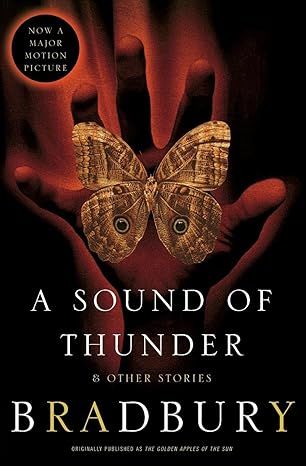
A Sound of Thunder and Other Stories
4.5
-
524
$13.09
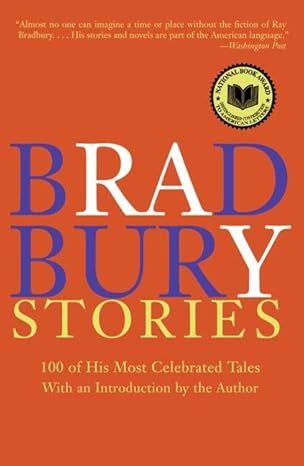
Bradbury Stories: 100 of His Most Celebrated Tales
4.7
-
1,363
$11.60
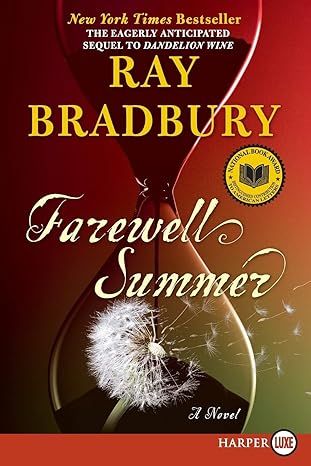
Farewell Summer
4.3
-
731
$0.99
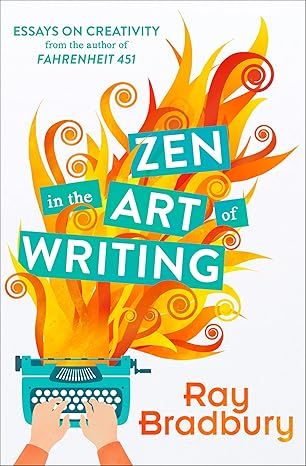
Zen in the Art of Writing
4.4
-
1,527
$14.33
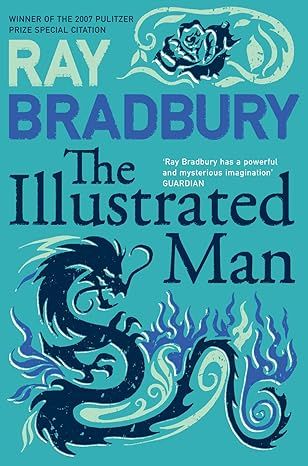
The Illustrated Man (Flamingo Modern Classics)
4.6
-
4,344
$9.31
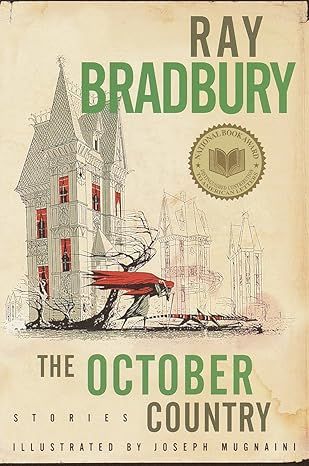
The October Country: Stories
4.6
-
1,736
$12.99
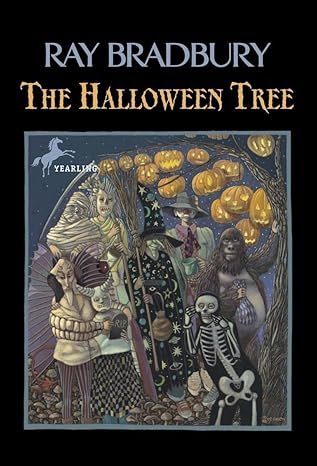
The Halloween Tree
4.6
-
3,112
$1.99
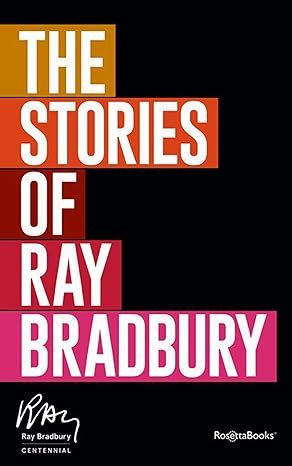
The Stories of Ray Bradbury: Introduction by Christopher Buckley (Everyman's Library Contemporary Classics Series)
4.7
-
1,003
$2.99

Dandelion Wine (English and French Edition)
4.5
-
3,529
$14.36
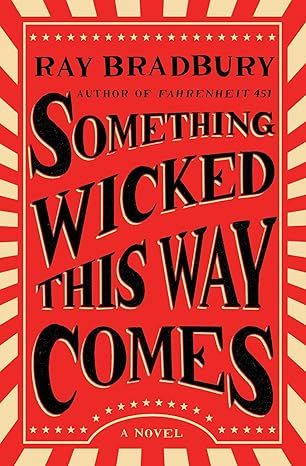
Something Wicked This Way Comes: A Novel
4.4
-
6,928
$0.99

Fahrenheit 451
4.6
-
52,920
$4.68
Best Sellers

The Tuscan Child
4.2
-
100,022
$8.39

The Thursday Murder Club: A Novel (A Thursday Murder Club Mystery)
4.3
-
155,575
$6.33

Sapiens: A Brief History of Humankind
4.6
-
140,302
$13.49

The Butterfly Garden (The Collector, 1)
4.3
-
88,556
$9.59

Things We Hide from the Light (Knockemout Series, 2)
4.4
-
94,890
$11.66

The Last Thing He Told Me: A Novel
4.3
-
154,085
$2.99

The Perfect Marriage: A Completely Gripping Psychological Suspense
4.3
-
143,196
$9.47

The Coworker
4.1
-
80,003
$13.48

First Lie Wins: A Novel (Random House Large Print)
4.3
-
54,062
$14.99

Mile High (Windy City Series Book 1)
4.4
-
59,745
$16.19

Layla
4.2
-
107,613
$8.99

The Locked Door
4.4
-
94,673
$8.53
